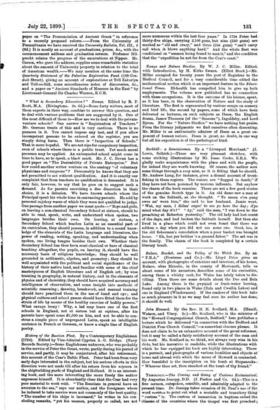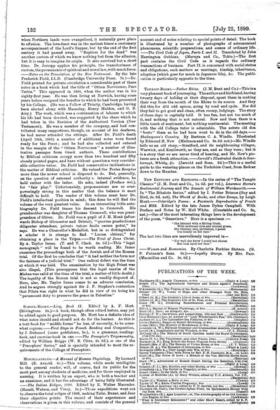THROLOGY.—The Coining and Going of Customs Ecclesiastical. By Augustus Jessopp,
D.D. (J. Parker and Co. 6d.)—This is a fine sermon, outspoken, sensible, and admirably adapted to the present time. Dr. Jessopp takes occasion of St. Paul's use of the word ove4ala to point out what a mutable and transitory thing " custom " is. The custom of immersion in baptism suited the climate of the countries where the Gospel was first preached ; when Northern lands were evangelised, it naturally gave place to effusion. The love-feast was in the earliest times a customary accompaniment of the Lord's Supper, but by the end of the first century it had passed away. "Baptism for the dead" was another custom of which we know nothing but from the allusion, but it is easy to imagine its origin. It also survived but a short time. Dr. Jessopp applies his principle, the transitoriness of custom, the per manence of spiritual and moral law, with much force. —Notes on the Translation of the New Testament. By the late Frederick Field, LL.D. (Cambridge University Press. 7s.)—Dr. Field printed for private circulation a considerable part of these notes in a book which had the title of " Otium Norvicense, Pars Tertia." This appeared in 1881, when the author was in his eighty-first year. He was then living at Norwich, having some years before resigned the benefice to which he had been presented by his College. (He was a Fellow of Trinity, Cambridge, having been elected along with Macaulay, Henry Malden, and G. B. Airy.) The work, which was a continuation of labours to which his life had been devoted, was suggested by the share which he had taken in the Revision of the Authorised Version (New Testament). He was a member of the company, and had con- tributed many suggestions, though, on account of his deafness, he bad never attended the sittings. After Dr. Field's death (April 19th, 1885) a number of additional notes were found ready for the Press ; and he had also collected and entered in the margin of the " Otium Norvicense " a number of illus- trative passages from Greek authors. These contributions to Biblical criticism occupy more than two hundred and fifty closely printed pages, and have without question a very consider- able collective value. Dr. Field had conservative inclinations in the matter of Biblical criticism. He valued the Textus Receptus more than the newer school is disposed to do. But, generally, on the question of external authority v. internal evidence, he held rather with the latter. He asks, indeed (Preface xvi.), for "fair play." Unfortunately, prepossessions are so over- poweringly strong in this matter that the balance is most difficult to hold. The reader of this volume must bear Dr. Field's intellectual position in mind ; this done he will find the volume of the very greatest value. In an interesting little auto- biography Dr. Field traces his descent to Cromwell. His grandmother was daughter of Thomas Cromwell, who was great- grandson of Oliver. Dr. Field was a pupil of J. II. Monk (after- wards Bishop of Gloucester and Bristol), "quorum pmelectiones diligenter attendens, privato tutore facile carere potui," he
says. He was a Chancellor's Medallist, but in so distinguished a scholar it is strange to find "Locum obtinui," for
obtaining a place in the Tripos.—The Trial of Jesus Christ.
By A. Taylor Innes. (T. and T. Clark. 2s. 6d.)—This "legal monograph" will be found to be worth reading. Mr. Innes examines the proceedings both of the Jewish and of the Roman trial. Of the first he concludes that "it had neither the form nor the fairness of a judicial trial." One radical defect was the time at which it was held. The examination by the High Priest was also illegal. (This presupposes that the legal maxim of the Miehna was valid at the time of the trial, a matter of little doubt.) The legality of the Roman trial is not so readily disposed of. Here, also, Mr. Taylor Innes comes to an adverse conclusion. And he argues strongly against Sir J. F. Stephen's contention that Pilate was right in what he did in view of its being his "paramount duty to preserve the peace in Palestine."



































 Previous page
Previous page